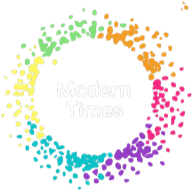Modern Times’ mandate is to give a voice to artists; to this end, we would like to share a series of essay pieces written by former artists of Modern Times, specifically, but not limited to, those from Black, Indigenous or racialized communities, to give them a voice and highlight their creative work. Our seventh article in this series is from charles c. smith, Executive Director of Cultural Pluralism in the Arts Movement Ontario (and Modern Times’ board chair), who speaks about the inclusive space that Modern Times has created in Toronto’s theatre community.
by charles c. smith
Modern Times (MT) has a rather expansive view on inclusive space. In the productions and rehearsals I’ve seen, MT brings people together from various backgrounds and I find I feel quite comfortable either as a board member or sitting in the audience. Why is this so? Well, first off, the cast chosen for any production is diverse on a variety of levels with performances delivered by actors who are Indigenous, Black, Latinx, young, been around awhile and all are remarkable. Having sat in on some rehearsals years ago, the energy and commitment of such casts provides a lot of fuel to interpreting the work as led by Soheil.
As for audiences, more than I don’t feel alone in a White space, I meet up with many friends, colleagues and allies involved in the arts who are incredibly appreciative of MT’s work and commitment to staging play from around the world that put forward a diverse set of actors from all backgrounds, particularly Indigenous, Black and People of Colour.
MT’s board, key players – Soheil, Peter and Gia – share the importance of having diverse peoples involved actively as Board members, volunteers, donors and performers.
To me, that’s what an inclusive company should be doing – finding the best talent and giving that talent opportunities to shine either on stage, in the planning and decision-making, in the volunteers and in the audience.
I was struck by the turnout and attendance at the 30th anniversary celebration and to see so many who have come to love and support MT as it clears a path for the future. Buddies in Bad Times was a full house that night and there was much joy and celebration coming from all who were there and will, I’m sure, be there again when we emerge from the cloud of this pandemic.
Live performance is essentially a healing space. We gather to see performances to charge our batteries, our minds/hearts and souls and to connect with others who are searching for the same. We need this space – it creates community, sparks the imagination, gives us insights into current/past events, and shares with us the incredible creativity of performing artists, writers, producers, choreographers, stage managers, lighting and sound designers.
Through this we learn about all of the things that go into a production and chances to share the magic of what that is like when the lights go down, the curtain goes up and the performers hit the stage. There is nothing else like this – not TV, Netflix, Crave, Youtube, Zoom, Vimeo or live online performances. The sense of community is not evident in these as those who take in performance in this way are in much smaller numbers which may be quite homogenous and/or a grouping of family and friends whom one is already familiar with. Live performances change all that by opening so many other doors which is way live performance has been with us for centuries and from so many cultural groups.
Feature photo caption: “Postmarginal Workshop 2018”. Photo by Diana Manole

BIOGRAPHY: charles c. smith is a poet, playwright and essayist who has written and edited fourteen books. He studied poetry and drama with William Packard at New York University and Herbert Berghof Studios, drama at the Frank Silvera’s Writers’ Workshop in Harlem. He won second prize for his play Last Days for the Desperate from Black Theatre Canada, edited three collections of poetry (including the works of Dionne Brand, Marlene Nourbese Phillips, Claire Harris, Cyril Dabydeen, Lillian Allen, George Elliot Clarke), published four books of poetry and his poetry has appeared in numerous journals and magazines, including Poetry Canada Review, the Quille and Quire, Descant, Dandelion, Fiddlehead and others. charles was the founder of the Black Perspectives Cultural Program in Regent Park and has received writing grants from the Ontario Arts Council and the Toronto Arts Council.charles is the Executive Director of Cultural Pluralism in the Arts Movement Ontario and Artistic Director of the wind in the leaves collective, an interdisciplinary performance group combining his poetry with music, dance and visual arts which he founded in 2009. He lectures at the Humber College post-graduate program in arts administration. His new book of poetry travelogue of the bereaved was released in October 2014 along with his book of non-fiction The Dirty War: The Making of the Myth of Black Dangerousness. His chap book whispers was released in August 2014. he has published articles with Stanford Law and Policy, University of Toronto Press, Alberta Law Review, Captus Press and his writings on racial profiling and Black lives in Canada have been published by the Canadian Centre for Policy Alternatives. His research has been commissioned by several institutions including the Canada Council for the Arts. His most recent book of poems, destination out, was released in May 2018 by Tightrope Press.

